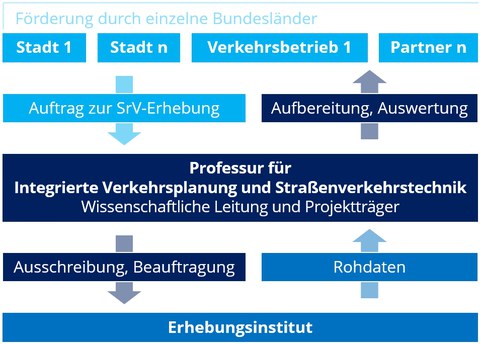Information for potential clients
Table of contents
Challenge
The debate about long-term, cost-intensive concepts and projects is part of the daily agenda in municipal transport planning. In this context, it is important to use increasingly scarce resources as effectively as possible and to factualize controversial debates by means of scientifically validated findings. The proper assessment of the risks and potentials of planning measures largely depends on the quality of the information and data used. In critical cases, the use of outdated data can lead to misjudgements and expensive misinvestments, as well as jeopardize the legal soundness of decisions.
The project "Mobility in Cities – SrV" offers interested cities and municipalities, public transport authorities, transport companies and associations to close some of the existing data gaps. At the local level, the survey concept developed according to scientific standards and based on the findings of mobility research makes an exceptionally valuable contribution. Decades of experience in the standardized preparation and evaluation of complex data sets guarantees high-quality data and insights into the status quo of everyday mobility, even at the cross-city level.
Advantages
The more cities participate in a SrV survey, the lower the costs per city. At the same time, the data base for conducting cross-city and comparative scientific studies increases. The results of these studies in turn benefit the SrV partners in the form of scientific articles and research reports.
The cost-effectiveness, the tailoring to the requirements of transport planning and the scientifically based survey concept are prompting more and more cities to become partners in this joint project. They are thus taking advantage of the opportunity to assess their traffic development both in terms of their own objectives and in comparison with other cities.
In addition, participation in a SrV survey offers other benefits:
- The uniform survey design allows for a meaningful comparison to similar cities (benchmark).
- The survey is repeated every five years, thus reliably continuing existing time series.
- The SrV Standard in terms of content and methodology ensures the comparability of results within the SrV time series.
- It is also possible to analyse specific areas of cities with an increase in the sample size.
- The standard evaluation includes a wide range of figures relevant to planning. It can be extended by city-specific additional evaluations.
- SrV data are tailored to requirements of common transport models.
- The grouping of cities enables the evaluation of model-relevant indicators for which samples of individual cities are usually too small.
- Local cooperation (e.g. between the city and transport companies) in commissioning the SrV surveys leads to synergy effects. Sharing the costs among several partners allows larger or additional samples, which in turn enable spatially differentiated analyses for the city itself or for the surrounding areas of core cities. At the same time, the comparability and consistency of the data basis in the planning area is improved.
- The coordination of important content-related and methodological survey characteristics with the federal survey Mobility in Germany (MiD) opens up further scope for evaluation and comparison.
- It is possible to apply for funding by the federal states.
Organisation
In the SrV surveys, the Technische Universität Dresden cooperates closely with cities, public transport authorities, transport companies and associations as well as the survey institute responsible for the field work.
The Chair of Mobility System Planning as a fiduciary of the client, provides scientific direction and coordination of the survey on behalf of and in close coordination with the SrV partners. It is responsible for the following tasks:
- Development of the survey concept
- Development of the survey materials
- Tendering and awarding of services for field work
- Monitoring the progress of the field work
- Data processing and evaluation
- Documentation of the results
Participation
 © IVST
© IVST
Research Associate
NameDr.-Ing. Frank Ließke
Auftraggeberkoordination SrV
Send encrypted email via the SecureMail portal (for TUD external users only).
Visiting address:
Gerhart-Potthoff-Bau, POT 216 Hettnerstraße 1
01069 Dresden
Office hours:
Mon-Fri (by appointment only)
The next round of the SrV survey will take place in 2028. Municipalities or other institutions interested in commissioning a sample for SrV 2028 in a city or region are invited to register without obligation.
Municipalities or other institutions that are considering participating in SrV 2028 are welcome to pre-register without commitment.
TU Dresden will begin preparations for the 2028 SrV round in early 2026 and will contact all current participants and potentially interested parties.
On May 4, 2026, a digital information event will be held for all interested municipalities and institutions. The materials from the SrV 2023 kick-off event are available for download.

